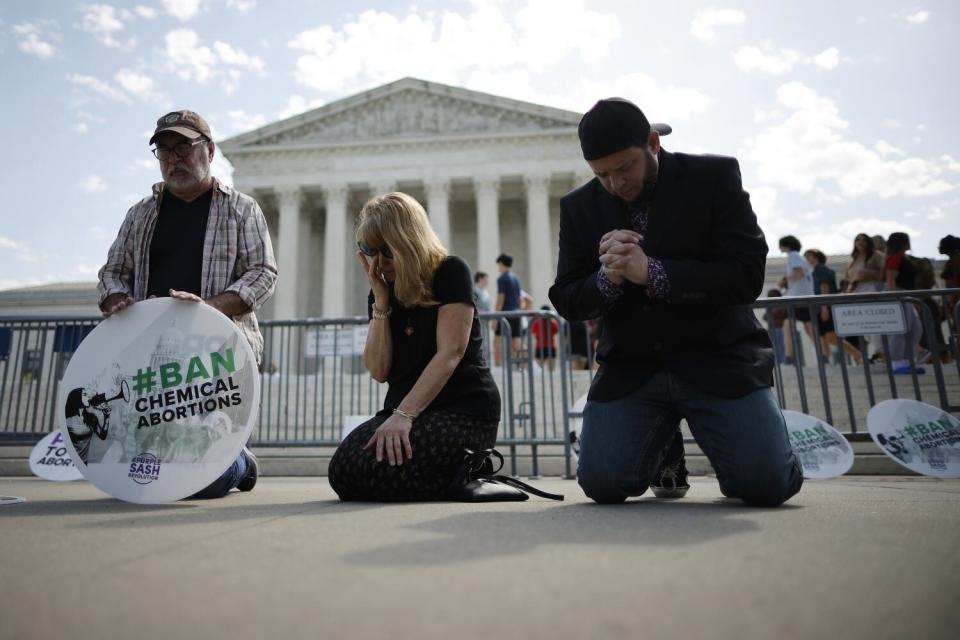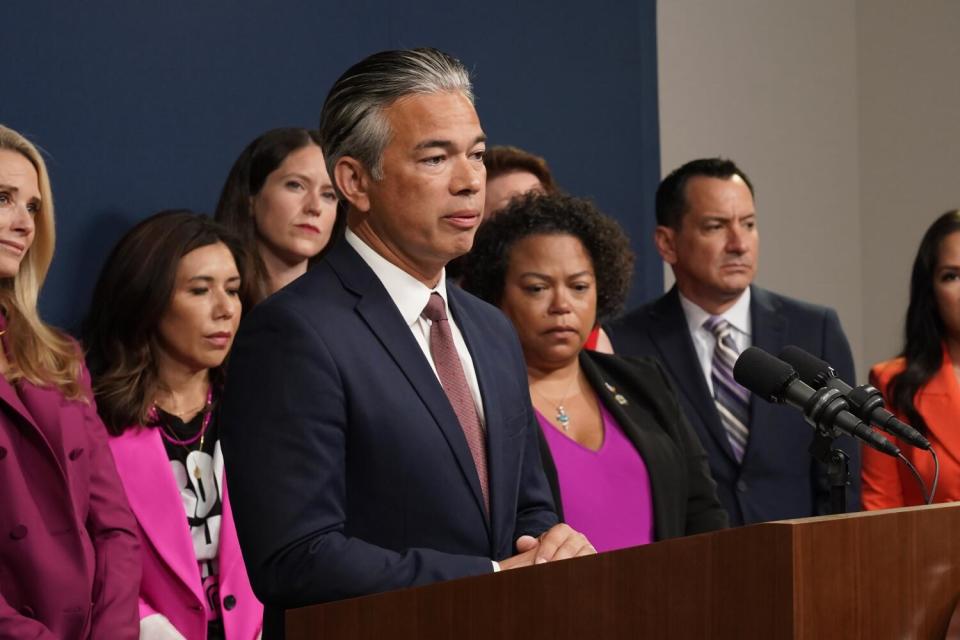How a San Diego doctor led the antiabortion movement to embrace controversial pill 'reversal'

Two months before the U.S. Supreme Court shot down an attempt to ban abortion medication, a San Diego County doctor who was a plaintiff in the case stepped onto a stage in Texas and warned that another civil war is coming — this time over an issue "deeper than" slavery.
"This is life versus death, much more fundamental to our existence and to our relationship with our creator than being free or being a slave," Dr. George Delgado said in April at an event hosted by the antiabortion group Life First. "This has a true potential to divide our country in a civil war. ... The pro-life states must remain vigilant."
Read more: The Supreme Court overturned Roe vs. Wade in 2022. Here’s the state of abortion rights in the U.S.
In a Supreme Court ruling this month, all nine justices declared that plaintiffs including Delgado, who has practiced medicine in California for more than 30 years, lacked standing and could not seek to pull abortion pills off the market simply because they are morally opposed.
The court unanimously voted to uphold access to abortion pills in the high-stakes case, ruling that the plaintiffs had made "too speculative" of a reach in their attempt to limit distribution of the medication.
But those criticisms have never stopped Delgado, who, against the backdrop of liberal California's mission to serve as a reproductive rights haven, has built an antiabortion empire based on what leading medical researchers have deemed unproven and potentially dangerous.

Delgado, a doctor who is certified in family medicine and palliative care but not in obstetrics and gynecology, is credited as the founder of so-called abortion pill reversal — a controversial protocol that is not approved by the Food and Drug Administration and has been condemned by major medical organizations but has become a key tool in the national antiabortion movement.
The "reversal" process involves administering shots of progesterone to women who have taken the first of a two-pill regimen to induce an abortion. It is offered at Culture of Life Family Services, a state-licensed community clinic in Southern California that boasts "Christ-centered medical care" and where Delgado serves as medical director.
Inside the Escondido clinic, located in a strip mall steps away from a Planned Parenthood, a crucified Jesus hangs on one wall and a lace rendering of the Last Supper hangs on another. Nearby stands a large statue of Mother Teresa holding a child.
Delgado declined to speak with a Times reporter who visited the clinic last week. He has not responded to numerous emails and phone messages seeking comment over the last two months.
As a regular guest on Catholic radio shows, conservative podcasts and at antiabortion events, Delgado, a 61-year-old soft-spoken man from San Marcos, talks openly about how his Catholicism influences his work as a doctor, often citing Pope John Paul II and Vatican documents.
The state-licensed doctor has voiced ethical concerns over in vitro fertilization on behalf of "the pre-born" and said embryos have "a right" to be gestated by only their biological mother. He has gone further than antiabortion Republicans who have pushed "fetal personhood" arguments — suggesting on a Catholic radio show last year that frozen embryos stored in labs be baptized, a move he acknowledged would melt and destroy them but at least they'd have a "course to salvation."
Since he published a controversial study about his abortion reversal method in 2018, Republicans in more than a dozen states including Arkansas and Kentucky have moved to pass laws requiring that abortion providers inform patients about it. Meanwhile, Democratic-controlled states such as California face an uphill battle in their attempts to limit Delgado's influence, with past court rulings favoring Christian pregnancy centers that promote his reversal method in the name of religious freedom.

The Supreme Court's decision earlier this month is unlikely to deter him — and abortion-rights advocates are worried more suits will follow. Since the undoing of federal abortion rights in 2022, Delgado has been on the road, urging conservatives to become more involved in the issue and evangelizing about abortion pill reversal, even as one study of it was halted over safety concerns.
Instead of leaving California for a friendlier political landscape, Delgado has deemed his home state "mission territory." During his keynote speech at an antiabortion event in Corona del Mar last year, the doctor paced the stage and gripped a microphone, pleading with attendees to spread the word about his work, warning it is threatened by an ongoing lawsuit by California's attorney general.
"The battle is on," he said at the Port Theater to applause. "Goliath is attacking us right here in our own backyard. So we need to step up and fight them every single step of the way."
Fifteen years ago, Erin Medina was consumed by a terrifying anxiety as she went alone to a Planned Parenthood in El Paso, Texas, to have an abortion.
She was unemployed and a single mother to a 4-year-old boy, she said, and could not imagine surviving with another child. But after taking mifepristone — the first medication in a two-pill abortion regimen — she felt a pang of regret.
"I was contemplating [abortion] because I had no support system. I was just trying to figure it out," Medina, now 45, told The Times. "I had received Christ the year before."
Medina said she delayed taking misoprostol — the second pill, which is meant to be taken up to 48 hours later — and dove into panicked internet research. She called a phone number she found on an antiabortion ministry website. That's when Delgado got involved.
"I've never heard of anybody reversing mifepristone. Let me think about it," Delgado recalled saying on a Catholic radio show in April, reflecting on the phone call he got that day from an antiabortion activist who told him about Medina.
Read more: Abortion pill usage surged post-Roe. These numbers show the dramatic rise
In his many public retellings of that moment, Delgado said that "the Holy Spirit" then quickly guided him to discover what he would later coin as abortion pill reversal.
Delgado's idea was predicated on experience he said he had in his family medicine practice helping women at risk of miscarriage by giving them doses of progesterone, a hormone that is known to support pregnancy.
Following what he said was a directive from God, Delgado rushed to find a physician in Texas through a network of providers who, like him, had been trained in natural family planning by a Catholic organization opposed to birth control.
"I explained to her what the situation was," Delgado said of the Texas physician. "I came up with the protocol on the fly and I offered that to her and she said, 'OK, I'll do it.'"
Medina went in week after week to get a progesterone shot in hopes of having a child. She ultimately gave birth to her daughter, who is now 15.
"I don't know the intricate medical stuff," she said. "But you have to believe in a higher power."
Medina has largely stayed out of the spotlight, distanced from the controversial movement she unknowingly helped ignite. But she represents both the reason antiabortion advocates are so enthusiastic about pill reversal — and the fear that it's generated among many medical professionals.
Mifepristone was not designed to be taken by itself, and the use of repeated doses of progesterone remains largely unstudied. The American College of Obstetricians and Gynecologists has deemed the practice “unethical” and “not supported by science."
In 2020, researchers at UC Davis — Delgado's alma mater — sought to study the method but cut it short after women were sent to the hospital. "Patients in early pregnancy who use only mifepristone may be at high risk of significant hemorrhage," the study said.

Reproductive health experts like Monica McLemore, a professor at the University of Washington nursing school, theorize that women like Medina could give birth not because of the administration of progesterone but because they did not take the latter abortion pill.
McLemore said that Delgado's movement is full of "ethical lapses," which include exaggerating the possibility of abortion regret — a rate that research has found is very low. The use of large doses of progesterone remains "untested and unstandardized," she said, and existing data are "weak" and lack routine scientific standards such as randomization and control groups.
“Abortion reversal is a misnomer. It is impossible to reverse a procedure," McLemore said in a video promoted by UC San Francisco, where she used to teach. "This intervention is not known to be safe or efficacious."
In Supreme Court records, though, Delgado described women in need of his help. He said abortion pill reversal has been "emotionally taxing" work for him.
"I see women who have a great deal of regret from undergoing the chemical abortion drug regimen," Delgado said in a declaration submitted to the court. "They are distressed, sad, and feel terrible about what they have done."
Read more: Supreme Court upholds FDA's approval of abortion pills for early pregnancies
In his efforts to convince the court he had legal standing, Delgado also said that abortions are bad for his business.
"When my patients have chemical abortions, there is a tangible financial loss to my practice in losing the opportunity to render professional prenatal care for the mother or to care for babies who are never born," Delgado said in the declaration.
Medication abortion is the most common way to terminate a pregnancy, and the FDA declared it safe and effective more than 20 years ago. Five million women in the U.S. have used the medication since then, and major adverse events occur in less than 0.32% of patients, according to a study touted by major medical groups including the American College of Obstetricians and Gynecologists.
Still, Delgado has called abortion pill access as it stands, available by mail order with a prescription from a medical provider, "the Wild, Wild West" and warned that a patient "could die in the bathroom of her own home."
In 2018, Delgado's career catapulted to new heights when he handed over his grassroots network promoting abortion pill reversal to Heartbeat International — a Christian-based organization that oversees thousands of crisis pregnancy centers dedicated to preventing abortion.
The organization now operates a 24/7 "abortion pill rescue" hot line that connects patients to providers willing to administer progesterone in attempts to keep a pregnancy going. Heartbeat International claims that more than 5,000 babies have been born because of abortion pill reversal, and that they receive 150 calls about it a month from women who took the first pill and then changed their minds.
Delgado, who serves as a medical advisor for Heartbeat International, has helped the organization provide women "with a second chance to choose life," spokesperson Melissa Hawkins said.
Read more: California sues religious pregnancy clinics over 'abortion pill reversal' claims deemed false
California's Democratic leaders view the clinics differently: as spreaders of "lies and misinformation,” California Atty. Gen. Rob Bonta said at a news conference last year where he announced a lawsuit against Heartbeat International and a San Francisco Bay Area chain of crisis pregnancy centers, alleging false advertisement of abortion pill reversal.
But crisis pregnancy centers that offer abortion pill reversal have so far evaded attempts at regulation despite the controversy.
Bills in the California Capitol last year that aimed to hold the centers accountable for false or misleading statements stalled before they made it to the governor's desk. That failure, in a state that favors maintaining legal access to abortion, indicates how difficult regulating abortion pill reversal may prove to be, as proponents pursue 1st Amendment arguments for religious freedom.
"We think our case is going to be successful," Bonta told The Times this month. "People in vulnerable positions when it comes to healthcare deserve the truth."

Hawkins said that California and New York — where the attorney general has filed a similar lawsuit — are "attempting to silence" their mission and are thus forcing abortions.
"Women deserve the right to make informed choices, and denying them access to this truth is unjustifiable," she said.
Delgado's recent Supreme Court case is just one chapter in his years-long mission to change abortion laws. He has testified before state legislatures and in courtrooms about abortion pill reversal, and launched a nonprofit dedicated to expanding his research and changing "public opinion and policy" on the issue.
And his use of his medical degree to promote his beliefs has been questioned. During the height of the pandemic, he worked to help a San Diego church sue Gov. Gavin Newsom over a ban on in-person gatherings amid concerns about the spread of COVID-19.
The church lost its case with the 9th Circuit Court of Appeals, which upheld a lower court ruling that gave Delgado's research "minimal weight" and dismissed it as "likely inadmissible" because of his lack of experience in public health or epidemiology. The Supreme Court ultimately ruled in favor of the church.
Read more: Opinion: Abortion foes lost Round One on mifepristone. Here's how their fight continues
As abortion-rights advocates remain concerned about the future despite the Supreme Court decision on mifepristone, Delgado has shown no signs of stopping. In the past year, he has increasingly focused on the political, riling up conservative voters to be as engaged as abortion-rights activists post-Roe.
"We need to be as shrewd as them — as sly as wolves — so we can defeat them on the political battlefield," Delgado told the Catholic Diocese of Lincoln, Neb., at an event this year.
California isn't the only state that has tried to counter Delgado's mission. Colorado became the first state to attempt to ban abortion pill reversal, with Gov. Jared Polis, a Democrat, signing a law last year to discipline doctors who perform it.
A federal judge later ruled that the law probably violates the U.S. Constitution's guarantee of religious freedom. Abortion pill reversal remains legal there.
This story originally appeared in Los Angeles Times.

 雅虎香港新聞
雅虎香港新聞 